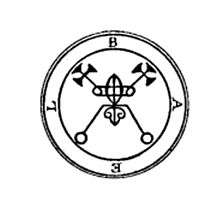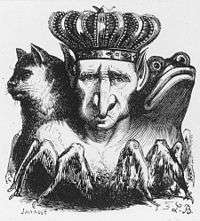Bael (demon)
Bael is a demon described in demonological grimoires such as the Lesser Key of Solomon and the Pseudomonarchia Daemonum (where he is the first spirit mentioned) and also described in the Dictionnaire Infernal. He is described as a hoarsely-voiced king with the power to make men invisible and ruling over sixty-six legions of demons.[1][2][3][note 1] The Lesser Key of Solomon describes him as appearing in the form of a cat, toad, man, some combination thereof, or other "divers [sic] shapes,"[4] while the Pseudomonarchia Daemonum and the Dictionnaire Infernal state that he appears with the heads of a cat, toad, and human simultaneously.[2][3] Colin de Plancy wonders if Bael is the same as the Canaanite deity Baal,[3] a reasonable conclusion.[5][6] In the Livre des Esperitz, Bael (as Beal) is described as a king ruled by Orient (Oriens), still possessing the power of invisibility, as well as the power to garner the favor of others, but ruling over only six legions of demons.[7] The Liber Officium Spirituum features Baal, Baall, Boal, or Boall, again a hoarsely-voiced king (or sometimes a soldier), with not only powers of invisibility but also sciences and love.[8] Sloane MS 3824 mentions Baal, in "Of the Demon Rulers," as a king ruled by Oriens, attributed with teaching science, (again) granting invisibility, and controlling 250 legions of spirits.[9] Bael appears in later editions of the Grimoire of Pope Honorius, under Astaroth, as a prince whose powers include (again) invisibility and popularity.[10] In the Grand Grimoire, Bael (as Baal) is listed as a subordinate of Lucifuge Rofocale.[11] According to Rudd, Bael is opposed by the Shemhamphorasch angel Vehuiah.[12]


Footnotes
- Baal, as a deity, is also listed in an earlier and separate entry, though de Plancy does connect the two.
References
- Peterson, Joseph H., ed. (2001). Lemegeton Clavicula Salomonis: The Lesser Key of Solomon, Detailing the Ceremonial Art of Commanding Spirits Both Good and Evil;. Maine: Weiser Books. pp. 7–8. ISBN 1-57863-220-X.CS1 maint: ref=harv (link)
- Weyer, Johann (1563). Peterson, Joseph H. (ed.). Pseudomonarchia Daemonum (Liber officiorum spirituum). Twilit Grotto: Esoteric Archives (published 2000). par. 1.CS1 maint: ref=harv (link)
- de Plancy, Jacques Collin (1853). Dictionnaire infernal (in French). Paris: Sagnier et Bray. p. 71.CS1 maint: ref=harv (link)
- Peterson 2001, pp. 7-10.
- Gettings, Fred (1988). "Baal" and "Bael". Dictionary of Demons. London: Guild publishing. pp. 44, 45.
- Bane, Theresa (2012). "Baal". Encyclopedia of Demons in World Religions and Cultures. Jefferson, North Carolina: McFarland. pp. 64–65. ISBN 0786488948.
- Boudet, Jean-Patrice (2003). "Les who's who démonologiques de la Renaissance et leurs ancêtres médiévaux". Médiévales (in French) (44). Revues.org. par. 5, 25, 28, 40. Cite journal requires
|journal=(help)CS1 maint: ref=harv (link) -
- Porter, John (2011). Campbell, Colin D. (ed.). A Book of the Office of Spirits. Translated by Hockley, Frederick. Teitan Press. pp. 8–9, 22. ISBN 0933429258.CS1 maint: ref=harv (link)
- Porter, John; Weston, John (2015). Harms, Daniel; Clark, James R.; Peterson, Joseph H. (eds.). The Book of Oberon: A Sourcebook for Elizabethan Magic (first ed.). Llewellyn Publications. pp. 192–193, 204. ISBN 978-0-7387-4334-9.CS1 maint: ref=harv (link)
- Ashmole, Elias (2009). Rankine, David (ed.). The Book of Treasure Spirits. Avalonia Books. p. 165. ISBN 978-1-905297-27-6.CS1 maint: ref=harv (link)
-
- Banner, James, ed. (1999). The Grimoire of Pope Honorius. Translated by Ch'ien, Kineta (first ed.). Seattle, Washington: Trident Books. p. 15. ISBN 1879000091.CS1 maint: ref=harv (link)
- Rankine, David; Barron, Paul Harry, eds. (2013). The Complete Grimoire of Pope Honorius (First ed.). London: Avalonia Books. p. 221. ISBN 978-1-905297-65-8.CS1 maint: ref=harv (link)
- Waite, Arthur Edward (1913). "Part II, Chapter III: 'Concerning the Descending Hierarchy,' Section 1: 'The Names and Offices of Evil Spirits'". The Book of Ceremonial Magic. Internet Sacred Text Archive (published 2002). pp. 184–193.CS1 maint: ref=harv (link)
- Rudd, Thomas (2007). Skinner, Stephen; Rankine, David (eds.). The Goetia of Dr Rudd. Golden Hoard Press. pp. 366–376. ISBN 073872355X.CS1 maint: ref=harv (link)